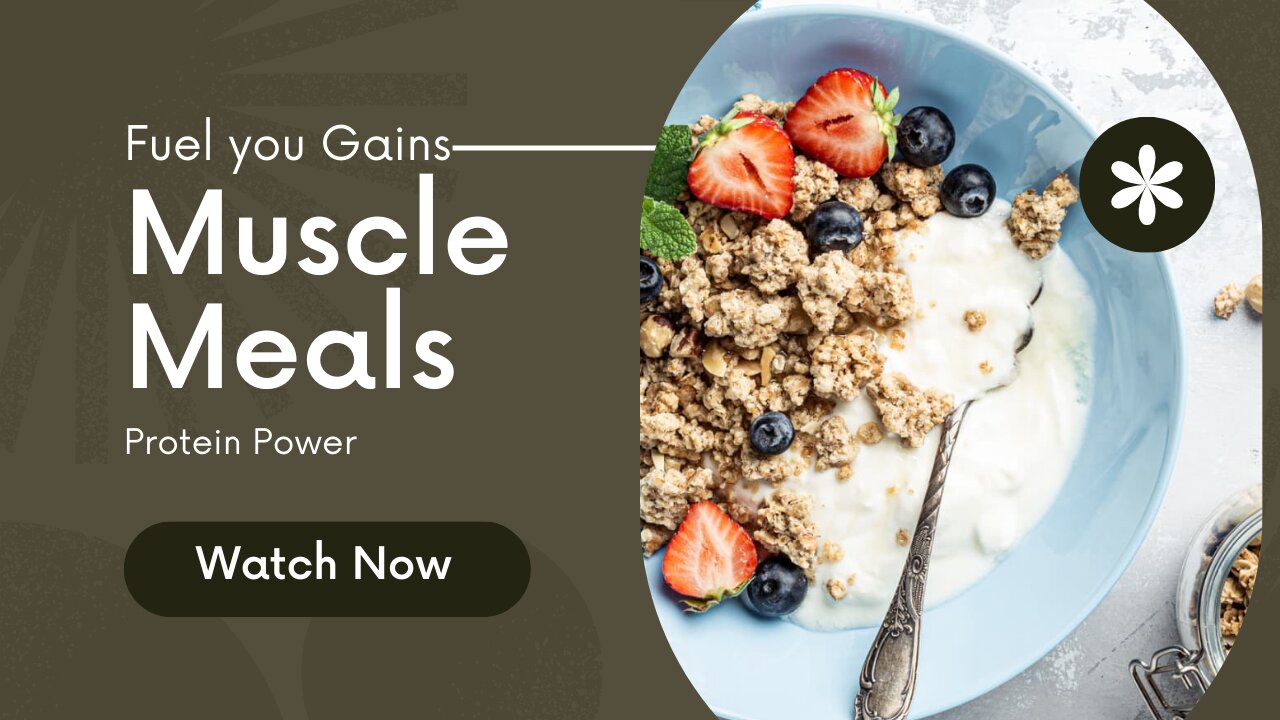Premium Only Content

Muscle Meals: Cooking Your Way to a Stronger, Healthier You with Protein Recipes
The video contains some special recipes of super protein food items that you can consider including in your diet who follow fitness:
1. Chicken breast: Chicken breast is an excellent source of protein, with 31 grams of protein per 100 grams.
2. Greek yogurt: Greek yogurt is high in protein and low in fat, with 10 grams of protein per 100 grams.
3. Tuna: Tuna is a great source of protein and also provides omega-3 fatty acids, with 30 grams of protein per 100 grams.
4. Quinoa: Quinoa is a complete protein, containing all nine essential amino acids, with 4 grams of protein per 100 grams.
5. Lentils: Lentils are high in protein and fiber, with 9 grams of protein per 100 grams.
6. Eggs: Eggs are a great source of protein and also contain essential vitamins and minerals, with 13 grams of protein per 100 grams.
7. Cottage cheese: Cottage cheese is a low-fat and low-calorie source of protein, with 11 grams of protein per 100 grams.
8. Turkey breast: Turkey breast is high in protein and low in fat, with 22 grams of protein per 100 grams.
9. Edamame: Edamame is a great plant-based source of protein, with 11 grams of protein per 100 grams.
10. Milk: Milk is a good source of protein and also contains calcium, with 3 grams of protein per 100 grams.
BENEFITS OF PROTEIN AND HOW IT SUPPORTS MUSCLE GROWTH!
Protein is essential for building and repairing tissues in the body, including muscle tissue. When you engage in physical activity, your muscles undergo microscopic damage, and consuming enough protein helps to repair and rebuild the damaged muscle tissue, leading to muscle growth.
In addition to supporting muscle growth, protein also has other benefits for those who follow fitness, including:
1. Increased satiety: Protein takes longer to digest than carbohydrates and fats, which means it can help keep you feeling full for longer, preventing overeating and helping with weight management.
2. Improved recovery: Protein can help speed up recovery time after exercise by reducing muscle soreness and improving muscle function.
3. Increased strength: Consuming enough protein can help improve muscle strength and power, allowing you to lift heavier weights and perform better during workouts.
4. Better body composition: Consuming enough protein can help you maintain or increase muscle mass while reducing body fat, leading to a better body composition.
It's important to note that the amount of protein needed varies depending on factors such as age, gender, weight, and activity level. However, in general, it is recommended that adults consume at least 0.8 grams of protein per kilogram of body weight per day. For those who follow fitness and engage in strength training, higher protein intake may be beneficial.
-
 27:28
27:28
Glenn Greenwald
12 hours agoGlenn Reacts to Trump's Gaza Take Over: System Update Special
181K419 -
 2:13:49
2:13:49
Melonie Mac
9 hours agoGo Boom Live Ep 36!
97.1K9 -
 1:02:11
1:02:11
Sarah Westall
9 hours agoFreezing USAID & its Operations in Ukraine: A Massive Money Laundering Organization? w/ Sam Anthony
87.4K17 -
 2:05:35
2:05:35
Space Ice
13 hours agoSpace Ice & Redeye: Neil Breen's Pass Thru
37K1 -
 1:00:23
1:00:23
The StoneZONE with Roger Stone
9 hours agoRoger Stone Talks Trump’s Electric First 100 Day Agenda | The StoneZone w/ Roger Stone
41.7K9 -
 DVR
DVR
Redacted News
12 hours agoBREAKING! EPSTEIN LIST INCOMING UNDER AG PAM BONDI? DEMOCRATS FREAKING OUT, PRINCE ANDREW NERVOUS
191K301 -
 52:02
52:02
Candace Show Podcast
14 hours agoBecoming Brigitte: An Inaccessible Past | Ep 2
177K266 -
 2:07:26
2:07:26
2 MIKES LIVE
13 hours ago2 MIKES LIVE #176 News Breakdown Wednesday!
33.6K2 -
 1:39:11
1:39:11
I_Came_With_Fire_Podcast
13 hours agoGAZA TAKEOVER | USAID EXPLAINED | TARIFF TAKEDOWN
51.8K10 -
 37:14
37:14
The Based Mother
14 hours ago $1.66 earnedFULL OF IT! Crooked politicians say they care about children. Their actions tell a different story.
31.4K5